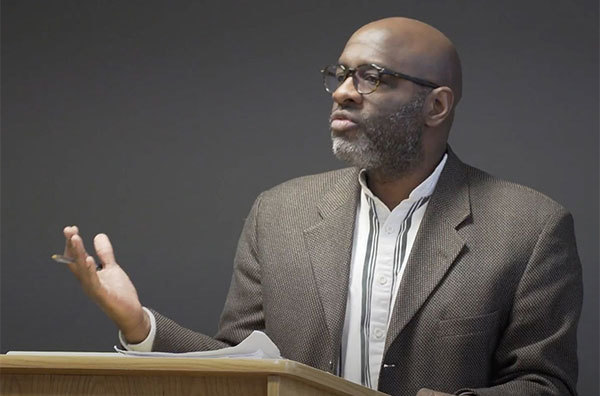January 15, 2021

From the very beginning, Notre Dame has wedded higher education and a mission of social justice. Our university has educated students not just to do well professionally and financially, but to do good in the world, indeed “to assist the world to create justice grounded in love,” as our mission statement asserts.
It gives me great pleasure to announce the Notre Dame Initiative on Race and Resilience, an initiative focused on the redress of systemic racism and the support of communities of color both within and beyond the Notre Dame campus.
You may ask why an initiative instead of a center and an institute? The Initiative on Race functions as a center or institute in terms of space, programming, and funding, but is designated an “initiative” to signal that it is one of Provost Marie Lynn Miranda’s highest priorities. Therefore, the Initiative on Race will provide a space – physical, intellectual, and emotional – in which students, scholars, artists, and activists gather to develop their respective projects, exchange ideas, and support one another.
Though the Initiative is new to Notre Dame, work on race and the support of communities of color has taken place here for decades on the part of many individuals, programs, and departments dedicated to racial equality. The Department of Africana Studies serves as a wonderful example. Its roots go back to the creation of the African Studies Program and Black Studies Program in the ‘60s and early ‘70s, respectively (history of Black studies at Notre Dame).
Leaders such as Father Hesburgh, Joseph Scott, Erskine Peters, Hugh Page, Richard Pierce, Dianne Pinderhughes, and many more created and sustained a space in which the histories, politics, and cultures of Africans and African diasporic peoples received rigorous critical reflection and where Black students, in particular, could find the guidance and emotional support they needed. One example of this support was the Erskine Peters Dissertation Fellowship program that provided funding and mentoring to black graduate students, producing a number of influential scholars including James Ford III, author of Thinking Through Crisis, winner of the William Sanders Scarborough Prize.
Or the individual efforts on the part of Maria McKenna, Richard Pierce, Father Paulinus Odozor, and many others have helped to nurture stellar Black alumni such as Nikole Hannah-Jones, McArthur Genius Award winner and creator of the 1619 Project at the New York Times.
But the history of Africana Studies is but one example of so many. The Institute for Latino Studies, the Klau Center on Civil and Human Rights, the Gender Studies Program, the Center for Literacy Education, Notre Dame Learning’s Kaneb Center, the Center for Social Concerns, the Department of American Studies, the Liu Institute for Asia and Asian Studies, the Office of Student Affairs, and many more have worked for decades to research race and/or to support students, faculty, and staff of color.
Therefore, when Sarah Mustilllo became Dean of the College of Arts and Letters, in the summer of 2018, and began to organize faculty and resources for an initiative on race, she had a solid foundation on which to build. In March of 2020, she convened a committee to research and write a proposal, and so through the spring and summer of 2020 professors La Donna Forsgren, Daniel Graff, Jaime Pensado, and Azareen Van Der Vliet Oloomi worked long and hard to give words to Dean Mustillo’s vision. Most recently, professors Maurizio Albahari, Jaimie Bleck, and Dianne Pinderhughes have joined the group as it transformed from the committee to the permanent Advisory Board for the Initiative. And all along the way, Elicia Dennis, Alissa Doroh, and Kate Garry have provided essential staff support without which the Initiative would not be possible.
All of us who believe in the work of the Initiative on Race owe everyone at Notre Dame, past and present, who has worked to build a more racially just world a great debt of gratitude.
Needless to say, the circumstances under which Notre Dame is creating this Initiative are pressing and dire. The COVID-19 pandemic has underscored radical disparities according to race and ethnicity in healthcare, jobs, and housing, not just in the United States but across the globe; the killing of Ahmaud Arbrey, Breonna Taylor, George Floyd, Rayshard Brooks, Andre Hill, and so many more have called attention to the systemic racism, intimidation, and brutality that Blacks and BIPOC communities more generally have been protesting for generations, and the 45th President of the United States actively pursued the nullification of votes by millions of Blacks across Georgia, Michigan, Pennsylvania, and Wisconsin to overturn an election that he clearly lost. Aided and abetted by too many elected officials who know better, he then incited a white nationalist mob to attack the Capital Building to prevent the ratification of the Electoral College vote.
In the face of these overlapping crises, I, like so many others, struggled to make sense of it all, and indeed to remain hopeful. But I remind myself that the struggle for racial equality and freedom has been a long one, stretching back to the first moment of European contact with the so-called New World, to the present moment, and beyond. Scholars, artists, and activists have historically bent their talents toward justice, and so the Notre Dame Initiative on Race and Resilience offers its talents in solidarity with communities anywhere and everywhere committed to racial equality and recuperative justice.
Sincerely,
Mark A. Sanders
Director of the Notre Dame Initiative on Race and Resilience
Professor of English and Africana Studies
I acknowledge my presence on the traditional homelands of Native peoples including the Haudenosauneega, Miami, Peoria, and particularly the Pokégnek Bodéwadmik /Pokagon Potawatomi, who have been using this land for education for thousands of years, and continue to do so.